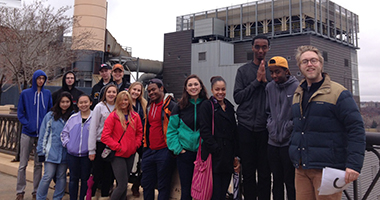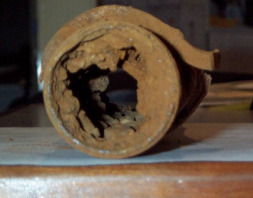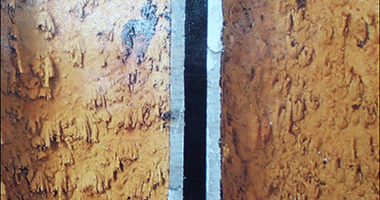President’s Letter
In June, I will complete my one-year term as Chair of the International District Energy Association. In this role, I have encouraged my industry peers to consider how we can inspire the next generation of community energy systems, through an investment in people, integration of energy grids, community energy, and innovation. These ideas are important for our industry, but also for our operations in Saint Paul. In recent months, District Energy St. Paul has made several commitments that create opportunities for our next generation.
On Earth Day last week, we announced our investment into Minnesota solar gardens. We will purchase approximately 50% of our annual cooling service electric load from community solar gardens. Our investment in community solar gardens gave us the opportunity to support renewable energy development and secure a long-term competitive rate for electricity. We are thrilled to be joining our customers Ecolab and Saint Paul Public Housing Authority who have already subscribed to community solar gardens. Our project partners plan to move forward with installations in 2016.
In addition to diversifying our energy portfolio, our company has also made another investment in Saint Paul with the purchase of the Jemne Building at the intersection of Kellogg Boulevard and St. Peter Street. This building has played an important role in the civic and cultural history of Saint Paul, and we are excited to become its new steward. As we plan for moving our offices into the Jemne Building this fall, we will be working to maintain its historic character while planning improvements that will showcase energy efficiency and sustainability. Saint Paul has been an important part of our company history, and we are excited to have the Jemne Building in the heart of the city be a part of our future.
 In April, we also furthered our commitment to the next generation of community members, energy customers, and potential talent for the energy sector. Along with the City of Saint Paul, Saint Paul RiverCentre and Xcel Energy Center, the Science Museum of Minnesota, and Metro Clean Energy Resource Team, we hosted 100 students from Central High School on a tour of the Saint Paul EcoDistrict. The students have been learning about clean energy and sustainability in their science class, and the tour was an opportunity for them to see technologies and practices in their community. Mayor Chris Coleman welcomed students and encouraged them to consider their own careers and commitments to sustainability before sending them off to see solar installations, district heating and cooling, electric vehicles, biomass, and composting and recycling programs.
In April, we also furthered our commitment to the next generation of community members, energy customers, and potential talent for the energy sector. Along with the City of Saint Paul, Saint Paul RiverCentre and Xcel Energy Center, the Science Museum of Minnesota, and Metro Clean Energy Resource Team, we hosted 100 students from Central High School on a tour of the Saint Paul EcoDistrict. The students have been learning about clean energy and sustainability in their science class, and the tour was an opportunity for them to see technologies and practices in their community. Mayor Chris Coleman welcomed students and encouraged them to consider their own careers and commitments to sustainability before sending them off to see solar installations, district heating and cooling, electric vehicles, biomass, and composting and recycling programs.
Our company is investing in the education of our young people, the potential of renewable energy, and a new home in downtown Saint Paul. I am overwhelmed by these tremendous opportunities because they are important today and crucial to our future as a company and community.
Read more about my thoughts on inspiring new industry talent in my Chair’s letter in District Energy magazine.
Ask the Engineer – Water Treatment for Your Heating System
This is the first article in a series that will focus on water quality in the various systems in your building, the importance of a regular water treatment schedule, and steps you can take if your system has not seen proper care in some time. The exterior of your mechanical system offers constant reminders of its need for maintenance; however, equally as important is managing the inside of your building’s pipes. Staying on top of the chemistry of the water in your building loops and performing regular maintenance will add years of trouble-free performance to your systems and save you money.
District Energy has an extensive water treatment program for its heating and cooling distribution system. Your service interface with District Energy is through an on-site heat exchanger(s) that separates the District Energy closed-loop system from your building water loop. District Energy’s treated water does not commingle with your building’s heating loop, therefore, your water needs to be monitored and chemically treated independently.
 A water treatment plan for your system will help to address a variety of issues that can damage pipes or hinder performance. The building’s closed-loop system must be sealed from the atmosphere to ensure that the water remains free of oxygen and carbon dioxide, which can lead to corrosion. The system must also provide for neutralization of water hardness agents, as well as protection from harmful gases in the make-up feed water. Even in the most efficient systems, water loss can result from leaking seals in valves, pumps, and expansion tanks, or other causes requiring the introduction of make-up water to satisfy the minimum system pressure required to serve the building. Feed water must have additional treatment to prevent the effects of deposits and corrosion and ensure that the pH value of the loop is maintained.
A water treatment plan for your system will help to address a variety of issues that can damage pipes or hinder performance. The building’s closed-loop system must be sealed from the atmosphere to ensure that the water remains free of oxygen and carbon dioxide, which can lead to corrosion. The system must also provide for neutralization of water hardness agents, as well as protection from harmful gases in the make-up feed water. Even in the most efficient systems, water loss can result from leaking seals in valves, pumps, and expansion tanks, or other causes requiring the introduction of make-up water to satisfy the minimum system pressure required to serve the building. Feed water must have additional treatment to prevent the effects of deposits and corrosion and ensure that the pH value of the loop is maintained.
 If your heating system is idle during the summer, water treatment becomes that much more critical. Stagnant, untreated water leads to corrosion and can also be a breeding ground for bacteria and biological growth. With properly treated water, you can avoid solid build-up on the heat transfer surfaces of the heat exchangers, eliminate pipe corrosion, and reduce fouling in the closed loop. To avoid pipe damage and keep your building systems running at optimal performance, it is imperative that operating engineers have the water circulating in the building’s heating loop checked by a chemical treatment consultant and maintain a regular testing and treatment schedule.
If your heating system is idle during the summer, water treatment becomes that much more critical. Stagnant, untreated water leads to corrosion and can also be a breeding ground for bacteria and biological growth. With properly treated water, you can avoid solid build-up on the heat transfer surfaces of the heat exchangers, eliminate pipe corrosion, and reduce fouling in the closed loop. To avoid pipe damage and keep your building systems running at optimal performance, it is imperative that operating engineers have the water circulating in the building’s heating loop checked by a chemical treatment consultant and maintain a regular testing and treatment schedule.
If you have questions about your building’s water treatment program, please contact the customer service team.
Customer Appreciation Day & World’s Largest Game of Catch
Spring is coming and we can almost hear the crack of the bat from down the road at the new CHS Field. To celebrate the Saint Paul Saints arrival in Lowertown, we will be hosting our annual Customer Appreciation Day at the new ballpark on Wednesday, May 20th, from 1:30 to 3:30 pm. We will be offering tours of the new ballpark and mechanical room for our valued customers.
Our customer appreciation event follows the World’s Largest Game of Catch that takes place in downtown Saint Paul from 11:30 am-1:00 pm at Mears Park. This is the 11th consecutive year for this event, which is hosted by the Saint Paul Saints and Greater Saint Paul BOMA. As lead sponsors of the event, we will be there distributing 2,500 commemorative balls and marching with the Saints to the new ballpark. We are excited to celebrate the start of a new season in a new ballpark with one of our newest customers!
Are you interested in attending Customer Appreciation Day? District Energy and District Cooling customers can RSVP by contacting us.
Vision for the Ford Site’s Future
Over the last few years District Energy St. Paul staff has been contributing their expertise to the City as it plans for the redevelopment of the Ford Site in Saint Paul. The Ford Site efforts span a broad set of focus areas, including housing variety, jobs and tax base, energy and sustainability, and transportation options. This site offers an incredibly unique opportunity to create an energy infrastructure that is flexible, resilient, low-carbon, and cost-competitive. Over the winter, the technical advisory group and the City’s engineering consultant, Ramboll, began exploring energy infrastructure options to unlock the true potential of this site. To further investigate what is possible, leaders from District Energy, Xcel Energy, the City of Saint Paul, Saint Paul Area Chamber of Commerce, Greater MSP, and the Saint Paul Port Authority, joined other civic leaders on a trip to Berlin (Germany), Copenhagen (Denmark), Malmo, and Stockholm (Sweden). The delegation toured redeveloped brownfield sites in these cities to learn about the big ideas in urban development that these leading-edge cities are making a reality. A wide variety of advanced technologies have been integrated into the energy infrastructure in the 10 sites that were toured, including solar thermal, solar photovoltaics, geothermal, and energy storage. Interestingly, district energy systems were utilized in all of the sites. District energy is a foundational infrastructure that allows many of the other technologies to work together so effectively. We were honored to be included in this tour and to continue playing a role in the future of the Ford Site. We are certain that this site can exceed expectations for sustainability and economic vitality through a continued commitment to these very proven technology options.
Busy Tour Season
District Energy has a long-standing commitment to energy systems education. This spring we have been especially busy with 13 tours of our plant and solar installation for students, educators, and community groups. Plant and solar tours are a great opportunity to explain how community energy systems work and how district energy is a key part of an efficient and renewable infrastructure. We hosted a particularly special tour this spring for 100 Central High School science students. The Central students toured District Energy in addition to a range of renewable technologies and sustainability practices in the Saint Paul EcoDistrict. The tour was a collaborative effort arranged by the Metro Clean Energy Resource Team (Metro CERT) and led by the EcoDistrict partners, which include the City of Saint Paul, Science Museum of Minnesota, Saint Paul RiverCentre, and District Energy. If you would like to learn more about how our system works, take a look at our educational tools Tour Signs and How it Works brochure.
Seasonal Maintenance
Our operations team is winding up their planned spring maintenance projects, which involves preventative maintenance to our combined heat and power plant. Our team applies years of experience with this equipment to make deliberate plans for maintenance work and repairs, to avoid unscheduled down time. Seasonal maintenance is scheduled in the spring and fall to work on the systems when heating and cooling demand is lower. In addition to the spring and fall maintenance, we have ongoing maintenance on the heating system which we can do throughout the summer and the cooling system maintenance can take place throughout the winter. Director of Production, Doug Audette said, “Members of our maintenance crew have been here a long time and they know this equipment really well. Their experience and commitment to the work contributes significantly to our production reliability.” Ongoing monitoring and testing helps identify potential equipment weaknesses before they become issues. The team uses thermal imaging to monitor electrical connections, vibration monitoring to assess equipment alignment and bearings, and equipment oil sampling as an additional bearing assessment. Doug added, “The company’s commitment to predictive maintenance means we don’t have to do a lot of corrective maintenance.” Spring maintenance wrapped up this week. Fall maintenance is slated to begin in September.
Great River Gathering
The Riverfront Corporation is hosting the 21st annual Great River Gathering on May 14th at the Saint Paul RiverCenter. This year the event is promoting and exploring the intersection of good health and place. District Energy is sponsoring the RiverWorks exhibit portion of the evening and is co-hosting a Saint Paul EcoDistrict placemaking workshop earlier in the day. Event details and tickets are available through the Great River Gathering website.
Neighborhood Construction
If you have traveled near our plant on Kellogg Boulevard recently, you have seen a significant amount of construction in progress. The bridge that suspends Kellogg Boulevard at Market Street is being replaced and our operations staff are working with construction teams to ensure that District Energy can maintain reliable service through the duration of the work. Our teams have helped to locate our service equipment like pipes and fiber optics to help avoid any issues. In some instances, we have built extra protections around pipes and the plant to prevent any potential damage.
Simultaneous to the work on Kellogg, demolition has started on the two buildings next to our plant, West Publishing and the Adult Detention Center. Ramsey County is managing the demolition to attract a site developer for the prime location. We are looking forward to the new development envisioned for these sites, and we will work with owners to develop innovative energy solutions for our potential new neighbors.
If you have business at our Kellogg offices, our sidewalk is still open.